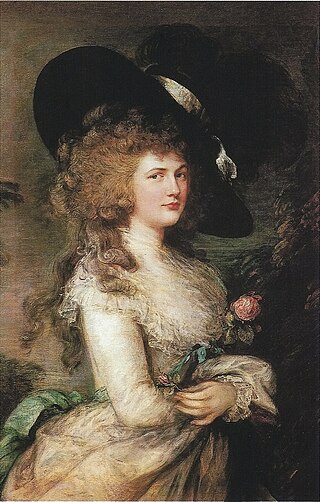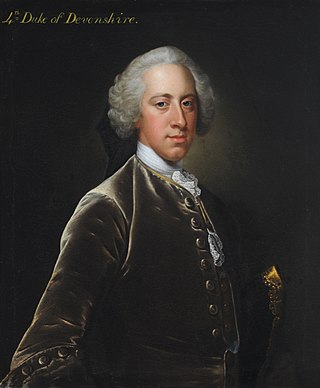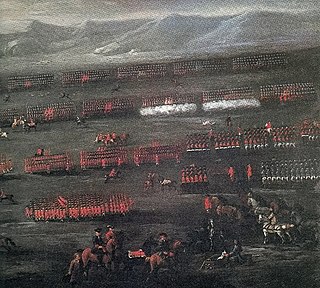Related Research Articles

Robin Hood is a legendary heroic outlaw originally depicted in English folklore and subsequently featured in literature, theatre, and cinema. According to legend, he was a highly skilled archer and swordsman. In some versions of the legend, he is depicted as being of noble birth, and in modern retellings he is sometimes depicted as having fought in the Crusades before returning to England to find his lands taken by the Sheriff. In the oldest known versions, he is instead a member of the yeoman class. Traditionally depicted dressed in Lincoln green, he is said to have stolen from the rich to give to the poor.

Sir Thomas de Ercildoun, better remembered as Thomas the Rhymer, also known as Thomas Learmont or True Thomas, was a Scottish laird and reputed prophet from Earlston in the Borders. Thomas' gift of prophecy is linked to his poetic ability.

Duke of Devonshire is a title in the Peerage of England held by members of the Cavendish family. This branch of the Cavendish family has been one of the wealthiest British aristocratic families since the 16th century and has been rivalled in political influence perhaps only by the Marquesses of Salisbury and the Earls of Derby.

Georgiana Cavendish, Duchess of Devonshire, was an English aristocrat, socialite, political organiser, author, and activist. Born into the Spencer family, married into the Cavendish family, she was the first wife of William Cavendish, 5th Duke of Devonshire, and the mother of the 6th Duke of Devonshire.

Lismore Castle is a castle located in the town of Lismore, County Waterford in the Republic of Ireland. It belonged to the Earls of Desmond, and subsequently to the Cavendish family from 1753. It is currently the Irish home of the Duke of Devonshire. It was largely re-built in the Gothic style during the mid-nineteenth century for The 6th Duke of Devonshire.

William Cavendish, 1st Duke of Devonshire, was an English Army officer, Whig politician and peer who sat in the House of Commons from 1661 until 1684 when he inherited his father's peerage as Earl of Devonshire and took his seat in the House of Lords. Cavendish was part of the "Immortal Seven" which invited William of Orange to depose James II of England as part of the Glorious Revolution, and was rewarded for his efforts by being elevated to the Duke of Devonshire in 1694.

William Cavendish, 4th Duke of Devonshire,, styled Lord Cavendish before 1729, and Marquess of Hartington between 1729 and 1755, was a British Whig statesman and nobleman who was briefly nominal Prime Minister of Great Britain. He was the first son of William Cavendish, 3rd Duke of Devonshire and his wife, Catherine Hoskins. He is also a great-great-great-great-great-grandfather of King Charles III through the king's maternal great-grandmother.

Victor Christian William Cavendish, 9th Duke of Devonshire, known as Victor Cavendish until 1908, was a British peer and politician who served as Governor General of Canada.

William Paulet, 1st Marquess of Winchester, styled Lord St John between 1539 and 1550 and Earl of Wiltshire between 1550 and 1551, was an English Lord High Treasurer, Lord Keeper of the Great Seal, and statesman.

"Sir Patrick Spens" is one of the most popular of the Child Ballads, and is of Scottish origin. It is a maritime ballad about a disaster at sea.

Lionel is a character in Arthurian legend. He is the younger son of King Bors of Gaunnes and Evaine and brother of Bors the Younger. First recorded in the Lancelot-Grail cycle, he is a double cousin of Lancelot and cousin of Lancelot's younger half-brother Hector de Maris. He is also the subject of a traditional ballad.

John Ker, 3rd Duke of Roxburghe, KG, KT, PC was a Scottish peer, scholar and publisher.

The Battle of Sheriffmuir was an engagement in 1715 at the height of the Jacobite rising in England and Scotland. The battlefield has been included in the Inventory of Historic Battlefields in Scotland and protected by Historic Scotland under the Scottish Historical Environment Policy of 2009. Sheriffmuir is a remote elevated plateau of heathland lying between Stirling and Auchterarder on the north fringe of the Ochil Hills.
Willie O Winsbury is Child Ballad 100. The song, of which there are many variants, is a traditional Scottish ballad that dates from at least 1775, and is known under several other names, including "Johnnie Barbour" and "Lord Thomas of Winesberry".

The Heir of Linne is a traditional folk song existing in several variants.

The Vagabond King is a 1956 American musical film directed by Michael Curtiz and starring Kathryn Grayson, Rita Moreno, Sir Cedric Hardwicke, Walter Hampden, Leslie Nielsen, and Maltese singer Oreste Kirkop in his only feature film role. It was produced and distributed by Paramount Pictures. It is an adaptation of the 1925 operetta The Vagabond King by Rudolf Friml. Hampden plays King Louis XI. Mary Grant designed the film's costumes.
Hugh George Cholmondeley, 5th Baron Delamere, styled The Honourable Hugh George Cholmondeley from birth until 1979, is a British peer. He is a well-known figure in the evolution and development of post-colonial Kenya. He was educated at Magdalene College, Cambridge. He owns the vast Soysambu Ranch in Kenya.
The Bonville–Courtenay feud of 1455 engendered a series of raids, sieges, and attacks between two major Devon families, the Courtenays and the Bonvilles, in south west England, in the mid-fifteenth century. One of many such aristocratic feuds of the time, it became entwined with national politics due to the political weight of the protagonists. The Courtenay earls of Devon were the traditional powerbrokers in the region, but by this time a local baronial family, the Bonvilles, had become more powerful and rivalled the Courtenays for royal patronage. Eventually this rivalry spilled over into physical violence, including social disorder, murder, and siege.
Lord George William Montagu Douglas Scott, was a Scottish cricketer and soldier who was the third son of William Montagu Douglas Scott, 6th Duke of Buccleuch.
References
- ↑ Bell, Robert (1857). "Ancient Poems, Ballads and Songs of the Peasantry of England: Taken Down". Book on Google (page 65). Retrieved December 12, 2017.